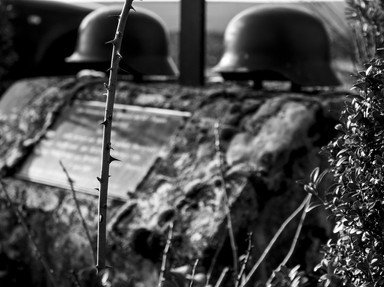Quiz Answer Key and Fun Facts
1. Sailors onboard a ship revolt against their superiors over some rotten meat, leading to a massacre on a huge staircase in Odessa.
Which film, directed by Sergei Eisenstein and released in 1925, am I talking about?
2. In a patriotic fever, a whole class of German schoolboys drops out of school and join the army. They are sent to the trenches where one by one they meet their inevitable fate.
Which film, directed by Lewis Milestone and released in 1930, am I talking about?
3. Two French airmen are shot down, captured and imprisoned in a German castle-cum-POW camp. They attempt to escape, along with a fellow French prisoner, but their captor Captain von Rauffenstein and his men are no pushovers.
Which film, directed by Jean Renoir and released in 1937, am I talking about?
4. Prisoners of war in Burma are made to work for the Japanese war effort and despite initially doing a poor job on purpose, the senior British officer won't allow British soldiers to do shoddy work.
Which film, directed by David Lean and released in 1957, am I talking about?
5. Lieutenant Joe Clemons leads a company of infantry into battle against Communist Chinese and Korean soldiers over a tiny piece of territory that has no strategic value whatsoever whilst a ceasefire is negotiated in Panmunjom.
Which film, directed by Lewis Milestone and released in 1959, am I talking about?
6. The Allied Forces are planning Operation Neptune, and the French resistance are up to their sabotage tricks, but the Wehrmacht can't work out if it's all just a diversion tactic, or if Operation Overlord is about to begin.
Which film, directed by various directors but produced by Darryl F. Zanuck and released in 1962, am I talking about?
7. A meager number of soldiers of the British army are defending Rorke's Drift in Natal against an attacking force that outnumbers them at least twenty to one.
Which film, directed by Cy Endfield and released in 1964, am I talking about?
8. A band of crooks, hoods and misfits is trained to go on a near-suicidal undercover mission to occupied France in exchange for clemency on their sentences.
Which film, directed by Robert Aldrich and released in 1967, am I talking about?
9. Field Marshal Montgomery's plan to bring World War II to a swift end is chosen over General Patton's proposal. However, Operation Market Garden soon goes pear-shaped and some divisions are left high and dry.
Which film, directed by Richard Attenborough and released in 1977, am I talking about?
10. Three friends leave their Pennsylvanian hometown and volunteer to go to Vietnam. They are captured and their Viet Cong captors force them to play Russian roulette, an experience that alters them forever.
Which film, directed by Michael Cimino and released in 1978, am I talking about?
Source: Author
thula2
This quiz was reviewed by FunTrivia editor
LadyCaitriona before going online.
Any errors found in FunTrivia content are routinely corrected through our feedback system.

